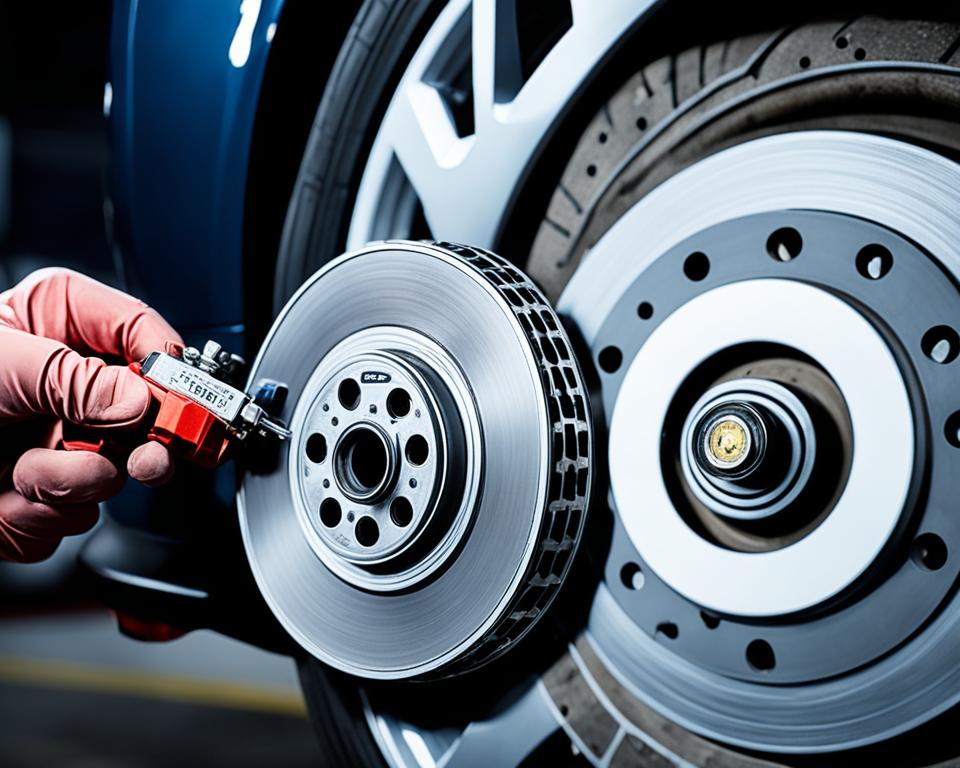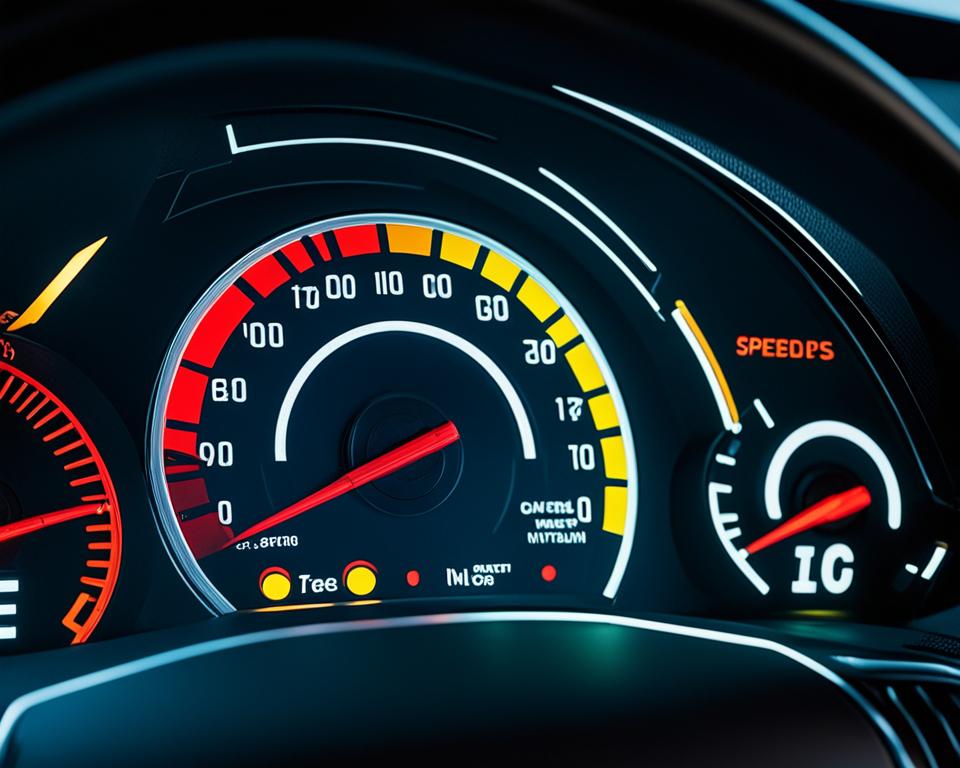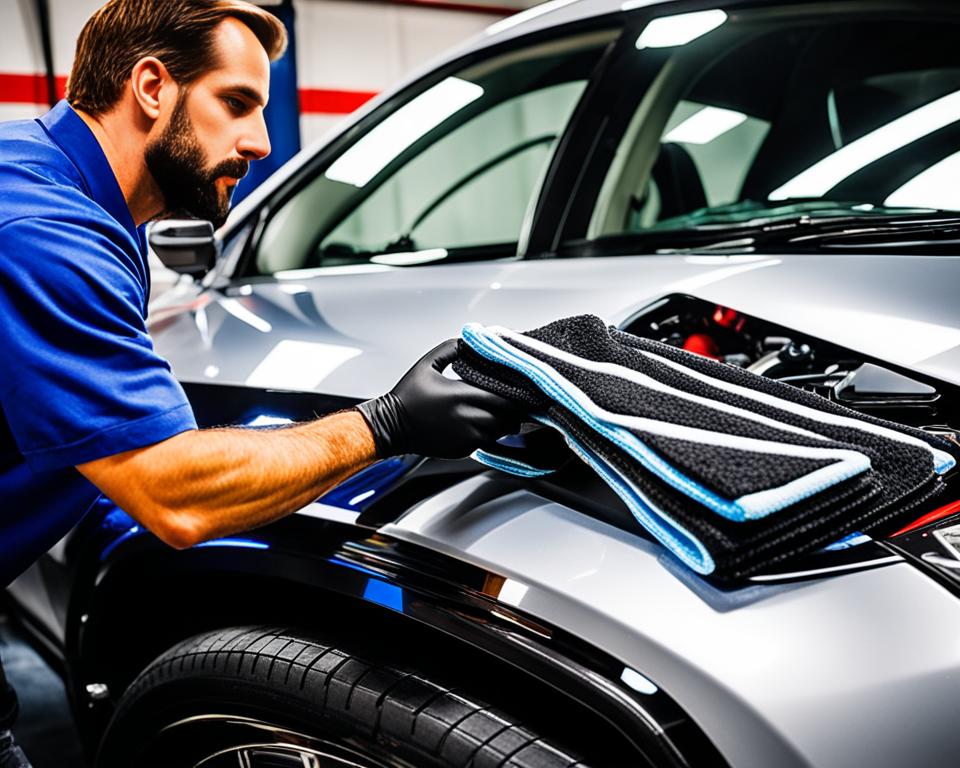Welcome to my comprehensive guide on maintaining the legacy of your high-end vehicle. Owning a luxury car is a symbol of status, style, and performance, but it also comes with the responsibility of proper care and maintenance. In this article, I will provide you with essential car maintenance tips and advice to ensure your high-end vehicle remains in top shape for years to come.
Whether you own a classic heritage car or the latest model from a prestigious brand, following the right car care practices is crucial. I will guide you through routine maintenance tasks, decoding warning lights, and understanding symptoms that may indicate potential issues. By taking proactive measures and understanding the true cost of car ownership, you can preserve the aesthetics, performance, and value of your high-end vehicle.
Are you ready to embark on a journey of automotive excellence? Let’s dive into the essential tips and best practices for maintaining the legacy of your luxury car.
Key Takeaways:
- Regular car maintenance is crucial for preserving the aesthetics, performance, and value of high-end vehicles.
- Understanding warning lights and symptoms helps identify potential issues before they escalate.
- The financial benefits of proactive maintenance outweigh the costs of reactive repairs.
- Maximizing safety through regular brake system checks is essential for the well-being of both the vehicle and its occupants.
- Maintaining peak performance year-round involves preventive maintenance strategies and goes beyond fuel efficiency.
The Philosophy Behind Preserving Automobile Excellence
High-end vehicles are not just means of transportation; they are expressions of luxury, performance, and craftsmanship. Preserving the heritage of automotive excellence involves maintaining the aesthetics, performance, and value of your luxury car. This section will delve into the philosophical aspects of car preservation, emphasizing the pride and joy that comes with owning and maintaining high-end vehicles.
Preserving the heritage of automotive excellence
When it comes to luxury car care and high-end vehicle maintenance, it goes beyond basic car maintenance tasks. Preserving the heritage of automotive excellence means taking a holistic approach to ensure that every aspect of your luxury car is in pristine condition. This includes not only the exterior and interior aesthetics but also the performance, functionality, and long-term value of the vehicle.
By investing in regular car maintenance and adhering to manufacturer-recommended service schedules, you can preserve the initial elegance and performance that drew you to your luxury car. From routine maintenance tasks such as oil changes and tire rotations to more specialized care like detailing and interior preservation, preserving automotive excellence requires attention to detail and a commitment to quality.
Moreover, heritage car care extends beyond the individual owner and their car. It encompasses an appreciation for the intricate engineering, artisan craftsmanship, and automotive history that define luxury vehicles. By preserving your luxury car, you contribute to the larger narrative of automotive excellence and become part of a lineage of skilled car owners who understand the value and beauty of these vehicles.
Classic car preservation plays a crucial role in honoring automotive heritage. It involves preserving the original features, design, and performance characteristics of vintage and classic cars. By maintaining classic cars in their authentic state, owners ensure that future generations can experience and appreciate automotive marvels from bygone eras.
Overall, preserving automobile excellence is not just about maintaining a vehicle; it’s about cherishing and upholding the legacy of high-end automotive craftsmanship. It’s about embracing the pride and joy that comes with owning and caring for a luxury car, and ensuring that it continues to exemplify the epitome of automotive excellence for years to come.
Choosing Reliability: The Cornerstone of Vehicle Longevity
When it comes to car ownership, reliability is paramount. Choosing a reliable car sets the foundation for long-term vehicle longevity. A reliable car ensures that you can depend on it for years to come, providing peace of mind and minimizing the likelihood of unexpected breakdowns or costly repairs.
So, what factors should you consider when purchasing a reliable vehicle? First and foremost, brand reputation plays a crucial role. Look for brands that have a track record of producing dependable cars with a history of minimal issues. Research the brand’s reliability ratings and customer reviews to gain insights into the overall quality and performance of their vehicles.
Maintaining a long-lasting car also requires assessing the maintenance history of a vehicle. A well-maintained car with a documented service history is more likely to be reliable and have fewer mechanical problems. Request maintenance records from the previous owner or dealership and ensure that regular maintenance tasks, such as oil changes, tire rotations, and brake inspections, have been consistently performed.
When researching and selecting a dependable car, you can also consult reliable sources, such as independent car review websites or consumer reports, which provide detailed information about the reliability and durability of various car models. Pay attention to common issues reported by owners and take them into consideration when making your decision.
By choosing a reliable car, you are making an investment in the longevity and dependability of your vehicle. It’s a decision that will ultimately save you time, money, and stress in the long run. So, take the time to thoroughly research and select a vehicle that meets your reliability requirements, ensuring years of worry-free driving.

Understanding the True Cost of Car Ownership
Owning a car goes beyond the initial purchase price. It’s important to consider the financial responsibilities that come with car ownership, including the cost of maintaining and servicing your vehicle. By understanding the true cost of car ownership, you can make informed decisions that will help you budget effectively and ensure the long-term health of your vehicle.
Decoding Dashboard Warning Lights for Proactive Care
Dashboard warning lights are your car’s way of communicating with you. These indicators can alert you to potential issues or malfunctions in your vehicle. It’s crucial to understand the meaning behind these warning lights and take proactive measures to address any problems early on. By decoding dashboard warning lights and taking prompt action, you can prevent further damage and potentially save on expensive repairs in the future.
The Financial Wisdom of Preventive Auto Maintenance
Investing in preventive auto maintenance is a cost-effective approach to car care. By keeping up with routine maintenance tasks, such as oil changes, tire rotations, and fluid checks, you can prevent major issues from arising and extend the lifespan of your vehicle. While preventive maintenance may require an upfront investment, it can help you avoid costly repairs down the line and ultimately save you money in the long run.
Strategic Investment in Routine Servicing and Inspections
Routine servicing and inspections are strategic investments in the maintenance of your car. Regularly bringing your vehicle to a qualified mechanic for check-ups and servicing can help identify potential issues before they become major problems. These proactive measures can minimize the risk of breakdowns, ensure optimal performance, and uncover any hidden issues that may affect the safety and reliability of your vehicle. By making routine car servicing and inspections a priority, you can make informed decisions about necessary repairs and keep your car running smoothly.
| Car Maintenance Expenses | Cost-Effective Car Care | Financial Benefits of Maintenance |
|---|---|---|
| Regular servicing | Preventive maintenance | Extended vehicle lifespan |
| Repairs and replacements | Proactive care | Reduced risk of major breakdowns |
| Fluid changes | Early detection of issues | Lower long-term maintenance costs |
| Tire rotations | Increased resale value |
Maximizing Safety Through Regular Brake System Checks
Recognizing the Signs of Brake Wear
Safety is always a top priority when it comes to car maintenance. One of the most vital components for ensuring the safety of both the vehicle and its occupants is the brake system. Regular brake system checks are essential to maintain optimal brake performance and prevent potential brake system issues.
It’s important to be able to recognize the signs of worn brakes in order to take timely action. Signs of brake wear can include:
- Screeching or grinding noises when applying the brakes
- Reduced braking power or longer stopping distances
- Spongy or soft brake pedal
- Brake warning light illuminated on the dashboard
- Vibration or pulsation felt in the brake pedal
If you notice any of these signs, it’s crucial to address them promptly by seeking professional brake system maintenance. Ignoring worn brakes can lead to more severe brake system issues and compromise your safety on the road.

Why Brake Safety Awareness Month Matters
Brake Safety Awareness Month is an important initiative that raises awareness about the significance of brake safety. Taking place in August each year, this campaign serves as a reminder to prioritize regular brake checks and maintenance.
The campaign aims to educate drivers about the importance of brake safety and encourage them to schedule routine brake system inspections. By participating in Brake Safety Awareness Month, you demonstrate your commitment to maintaining your vehicle’s brake system and ensuring the safety of yourself and others on the road.
Brake safety should be a year-round consideration, but Brake Safety Awareness Month provides an opportunity to emphasize the importance of making brake maintenance a priority. By promoting brake safety, you contribute to a safer driving environment for everyone.
| Benefits of Regular Brake Checks | Importance of Brake Safety |
|---|---|
|
|
Car Maintenance Tips: Ensuring Peak Performance Year-Round
Maintaining peak performance year-round is crucial for any vehicle, especially high-end cars. To help you keep your car in top shape, I will provide you with practical car maintenance tips that will ensure optimal performance throughout the year.
Reactive vs. Preventive Car Maintenance Strategies
When it comes to car maintenance, there are two primary approaches: reactive and preventive. Reactive maintenance involves addressing issues as they arise, waiting for symptoms to appear before taking action. On the other hand, preventive maintenance focuses on proactive care to prevent problems from occurring in the first place.
Reactive maintenance may seem more convenient and cost-effective initially, but it can lead to costly repairs and potential breakdowns in the long run. Preventive maintenance, on the other hand, involves regular inspections, servicing, and addressing minor issues before they escalate, ultimately saving you time, money, and stress.
To implement a preventive maintenance strategy, consider the following:
- Schedule regular servicing and inspections based on your manufacturer’s recommendations.
- Keep track of maintenance tasks, such as oil changes, fluid checks, and filter replacements.
- Pay attention to your car’s warning lights and address any issues promptly.
- Monitor tire pressure and tread depth regularly.
- Follow best practices for safe driving and vehicle operation.
Maintaining Your Car Beyond Gas Savings
While maximizing fuel efficiency is important, car maintenance goes beyond just saving on gas. It plays a crucial role in maximizing your car’s lifespan, preserving its value, and ensuring a smooth and enjoyable driving experience.
By following a comprehensive car care strategy, you can maintain your vehicle’s performance, safety, and reliability year-round. This includes regular maintenance tasks like fluid checks, filter replacements, and tire rotations, as well as addressing any issues promptly to prevent further damage.
Investing in routine maintenance now can help you avoid costly repairs and extend the life of your car. Additionally, a well-maintained vehicle often offers better resale value, making it a wise investment in the long run.
Heeding the Call of Warning Lights: A Driver’s Responsibility
Warning lights on the dashboard of your car serve as indicators of potential issues. It is the responsibility of every driver to pay attention to these warning lights and take immediate action. Failure to address these warning signs can result in further damage to your vehicle and compromise your safety on the road.
Understanding the significance of car warning lights is essential in maintaining the overall health and functionality of your vehicle. Whether it’s a check engine light, ABS warning, or low tire pressure indicator, each warning light signifies a specific problem that requires attention. Ignoring these warning lights can lead to more costly repairs and potentially hazardous situations.
When a warning light illuminates on your dashboard, it is crucial to diagnose the issue promptly. Vehicle diagnostics are designed to identify the root cause of the problem and provide valuable information for necessary repairs or maintenance. By utilizing diagnostic tools or seeking professional expertise, you can address the underlying issue effectively.
As a responsible driver, it is your responsibility to respond promptly to warning lights. By taking immediate action, you can prevent further damage and ensure the longevity of your vehicle. Don’t ignore these important indicators – they are there to help you stay informed and maintain the optimal performance of your car.

Driver Responsibility Checklist:
- Regularly check your dashboard for warning lights
- Seek professional help or consult the vehicle manual for guidance
- Address warning lights promptly to prevent further damage
- Understand the importance of vehicle diagnostics
- Follow maintenance schedules to prevent potential issues
- Stay updated on car care techniques and preventive measures
By taking responsibility for understanding and addressing warning lights, you can ensure the safety, longevity, and optimal performance of your vehicle. Remember, your attention to warning lights can save you time, money, and potentially prevent accidents on the road.
Listening to Your Car: Deciphering Noises and Symptoms
Your car is not just a means of transportation; it also communicates with you through various noises and symptoms. By actively listening to your car and deciphering these cues, you can identify potential issues before they become major problems. Understanding car noises and vehicle symptoms is crucial for diagnosing and addressing underlying problems, ensuring the smooth operation of your vehicle and preventing costly repairs down the line.
One common car noise to pay attention to is a squealing sound coming from the brakes. This high-pitched noise often indicates that the brake pads are worn down and need to be replaced. Ignoring this symptom can lead to further damage to your brake system, jeopardizing your safety on the road.
Another significant symptom is the check engine light illuminating on your dashboard. This warning light can indicate a wide range of issues, from a loose gas cap to a more severe engine malfunction. Taking your vehicle to a qualified mechanic to diagnose the specific cause is essential for prompt and accurate repairs.
In addition to noises, abnormal vehicle symptoms can also provide important insights into potential problems. For example, a vibrating steering wheel may indicate an issue with your tires, such as unbalanced or misaligned wheels. Addressing this symptom promptly can help prevent uneven tire wear and ensure a smoother driving experience.
When diagnosing car issues based on noises and symptoms, it’s important to consult your vehicle’s owner manual for guidance. The manual can provide specific information about common car noises and symptoms associated with your make and model.
Remember, regular maintenance and inspections are crucial for early detection of potential issues. By listening to your car and promptly addressing any noises or symptoms, you can keep your vehicle in optimal condition and extend its lifespan.
Below is an image highlighting the importance of listening to your car:
| Noise/Symptom | Possible Cause |
|---|---|
| Squealing sound from brakes | Worn brake pads |
| Vibrating steering wheel | Unbalanced or misaligned wheels |
| Check engine light illuminated | Various potential issues, consult professional |
Fueling Efficiency: Auto Care Tips for Improved Mileage
Maximizing fuel efficiency is not only a smart financial move but also a responsible choice for reducing our environmental impact. By implementing a few auto care tips and strategies, you can effectively improve your car’s mileage and contribute to a more sustainable future.
One essential aspect of fuel efficiency is proper tire maintenance. Ensuring that your tires are properly inflated and aligned can significantly impact your car’s mileage. Underinflated tires can create unnecessary friction, leading to increased fuel consumption. Therefore, regularly checking and inflating your tires to the manufacturer’s recommended pressure is crucial.

In addition to tire maintenance, regular engine tune-ups play a significant role in optimizing fuel efficiency. A well-maintained engine operates more efficiently, resulting in better mileage. It is essential to follow your car manufacturer’s recommended service intervals for tune-ups and engine maintenance.
Furthermore, practicing efficient driving techniques can significantly improve your car’s fuel efficiency. Avoiding aggressive acceleration and sudden braking can reduce fuel consumption. Maintaining a steady speed, utilizing cruise control on highways, and anticipating traffic flow can further enhance your car’s mileage.
By implementing these auto care tips and strategies, you can maximize your car’s fuel efficiency, save money on fuel expenses, and contribute to a greener planet.
DIY Car Care: Simple Steps for Everyday Maintenance
Not all car maintenance tasks require a trip to the mechanic. There are several simple steps you can take for everyday maintenance to keep your vehicle in excellent condition. This section will cover basic DIY car care techniques, such as checking fluid levels, replacing air filters, and cleaning exterior surfaces.
Regular maintenance is essential for the longevity and performance of your vehicle. By performing these easy car maintenance tasks, you can save money on costly repairs and ensure that your car remains in optimal condition.
1. Checking Fluid Levels: Regularly check the oil, coolant, brake fluid, and windshield washer fluid levels. Low fluid levels can cause vehicle issues and must be topped up as needed.
2. Replacing Air Filters: Air filters trap dust, pollen, and debris, preventing them from entering the engine. Replace the air filters according to the manufacturer’s recommended schedule to maintain proper engine performance and fuel efficiency.
3. Cleaning Exterior Surfaces: Keep your car’s exterior clean by washing it regularly. Remove any dirt, grime, or bird droppings promptly, as they can damage the paint. Use a high-quality car wash soap and a soft sponge or cloth for best results.
4. Tire Maintenance: Check your tire pressure regularly and ensure that it meets the recommended levels specified by the manufacturer. Also, inspect the tires for any signs of damage, such as cuts, bulges, or uneven wear. Rotate the tires as recommended to ensure even wear and extend their lifespan.
5. Battery Care: Inspect the battery terminals for corrosion and clean them if necessary. If your car’s battery is not maintenance-free, check the electrolyte level and top it up with distilled water if needed. Additionally, ensure that the battery is securely mounted in its tray.
By incorporating these basic car care tasks into your routine, you can maintain the condition and performance of your vehicle without relying solely on professional mechanics. However, it’s important to note that some maintenance tasks, such as complex engine repairs or electrical issues, may require the expertise of a trained mechanic. Regular maintenance and periodic professional inspections are the key to keeping your vehicle running smoothly.
Building Trust With Skilled Technicians: The Journey to Reliable Car Repair
When it comes to car repairs, finding skilled and trustworthy technicians is crucial. Entrusting your vehicle to capable hands ensures reliable car repair services and peace of mind. Building trust with skilled technicians is a process that involves careful consideration and informed decision-making. Here are some valuable insights to help you navigate this journey:
- Selecting a reputable mechanic: Begin by researching and identifying highly regarded mechanics in your area. Look for certifications and affiliations with reputable organizations that validate their expertise. Reading reviews and seeking recommendations from friends, family, and online communities can also provide valuable insights into a mechanic’s reliability.
- Understanding repair quotes: Familiarize yourself with the components of repair quotes. A comprehensive quote should include a breakdown of labor costs, parts, and any additional charges or fees. Skilled technicians will be transparent about the repair process and explain the details of the quote to ensure clarity and understanding.
- Establishing a long-term relationship: Building a long-term relationship with a skilled technician fosters trust and reliability. Regularly servicing your vehicle at the same repair shop allows technicians to become familiar with your car’s history, enabling them to diagnose and address issues more efficiently. Additionally, consistent communication and feedback help establish mutual trust and understanding.
By carefully selecting a skilled technician and fostering an ongoing relationship, you can ensure that your car receives the reliable repair and maintenance it deserves.
Conclusion
In conclusion, throughout this comprehensive guide, we have explored essential tips and advice for effective car maintenance and care. By following these practices, you can maximize the lifespan of your vehicle and preserve its value. However, there may come a time when you need to assess whether to upgrade or repair your car.
Assessing When to Upgrade vs. When to Repair
When faced with car replacement decisions, it is important to consider factors such as the cost of repairs, the age of the vehicle, and the overall condition. While repairs may be a cost-effective solution in some cases, upgrading to a newer model may offer advanced features, improved fuel efficiency, and enhanced safety. It ultimately depends on your specific situation and priorities.
Joining the Legacy of Skilled Car Owners
By adopting a proactive approach to car maintenance, you become part of the legacy of skilled car owners. Taking pride in the upkeep of your vehicle not only ensures its optimal performance but also contributes to your personal satisfaction as a car owner. Embrace the opportunity to preserve automotive excellence and showcase your commitment to quality.
Navigating Resources and Expert Advice for Optimal Car Care
When it comes to finding reliable car care information and expert advice, there are numerous resources available. From manufacturer guidelines and owner’s manuals to online forums and trusted mechanics, these sources can provide valuable insights and assistance. By staying informed and seeking expert guidance, you can make informed decisions about car maintenance and care, ensuring optimal results.
Remember, car maintenance is a continuous process, and ongoing care is crucial for maximizing the lifespan and performance of your vehicle. By implementing the tips and strategies outlined in this guide and making informed choices about upgrades and repairs, you can enjoy a well-maintained car that brings you pride and joy for years to come.

